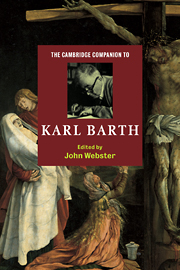Book contents
- Frontmatter
- 1 Introducing Barth
- 2 Theology
- 3 Revelation
- 4 The Bible
- 5 The Trinity
- 6 Grace and being
- 7 Creation and providence
- 8 Karl Barth’s Christology
- 9 Salvation
- 10 The humanity of the human person in Karl Barth’s anthropology
- 11 The mediator of communion
- 12 Christian community, baptism, and Lord’s Supper
- 13 Barth’s trinitarian ethic
- 14 Karl Barth and politics
- 15 Religion and the religions
- 16 Barth and feminism
- 17 Barth, modernity, and postmodernity
- 18 Karl Barth
- Index
11 - The mediator of communion
Karl Barth’s doctrine of the Holy Spirit
Published online by Cambridge University Press: 28 May 2006
- Frontmatter
- 1 Introducing Barth
- 2 Theology
- 3 Revelation
- 4 The Bible
- 5 The Trinity
- 6 Grace and being
- 7 Creation and providence
- 8 Karl Barth’s Christology
- 9 Salvation
- 10 The humanity of the human person in Karl Barth’s anthropology
- 11 The mediator of communion
- 12 Christian community, baptism, and Lord’s Supper
- 13 Barth’s trinitarian ethic
- 14 Karl Barth and politics
- 15 Religion and the religions
- 16 Barth and feminism
- 17 Barth, modernity, and postmodernity
- 18 Karl Barth
- Index
Summary
The doctrine of the Holy Spirit is, as Adolf von Harnack once observed, the 'orphan doctrine' of Christian theology. Unlike the doctrine of the Trinity or the doctrine of Christ's person, it has never been stabilized by a conciliar decision of the church, although it is as vexing, contested and uncertain as any doctrine the church has ever known. An omen of things to come emerged as early as the Council of Nicaea (ad 325). Diverted by dissension over other questions, the council produced a creditable statement of the church's belief in God the Father, and especially of its belief in the deity of God the Son (which was, of course, the chief point at issue), but then closed rather weakly by stating its belief, 'and in the Holy Spirit' - with no further elaboration at all.
The deficiency was partly remedied by the ensuing Council of Constantinople (ad 381). Words were added to the Nicene Creed which have remained normative for the church ever since. The Holy Spirit in whom the church believes, the Creed now stated, is ‘the Lord and Giver of life, who proceeds from the Father; who with the Father and the Son together is worshipped and glorified; who spoke by the prophets’. This statement, however slight, acknowledged the Holy Spirit’s full and unabridged deity, indicated something of the Spirit’s place within the Holy Trinity, and affirmed that the Spirit communicates God’s Word to us through select human intermediaries. Unaddressed, however, were many matters that would divide Christendom throughout its history right down to the present day. To speak only very generally, these were matters having to do with revelation and salvation, with ecclesiology, ministry and sacraments, with eschatology and society, with justification, sanctification and glorification, and above all, as perhaps the overarching issue, with the unity and distinction between the saving work of the Spirit and the saving work of Christ.
- Type
- Chapter
- Information
- The Cambridge Companion to Karl Barth , pp. 177 - 194Publisher: Cambridge University PressPrint publication year: 2000
- 3
- Cited by



